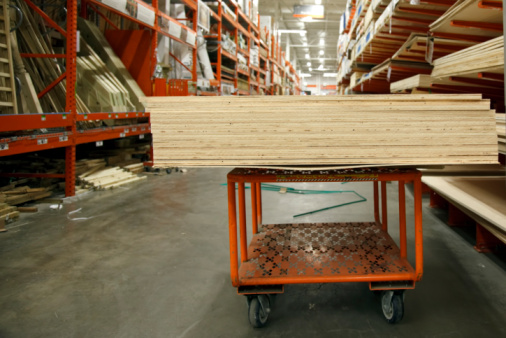Retail
After Earnings, Home Depot Stock More Expensive Than Lowe's
Published:
Last Updated:
The country’s two largest home improvement stores, Home Depot Inc. (NYSE: HD) and Lowe’s Companies Inc. (NYSE: LOW), have now reported results for the previous quarter, and one company put up a new 52-week high while the other lost more than 8% of its share price. Going forward, which stock offers the best value for investors?
Home Depot’s market value is more than double that of Lowe’s. The larger company operates more than 2,200 stores with 340,000 employees, compared with more than 1,700 stores and 160,000 employees at Lowe’s.
The consensus target price from Thomson Reuters for Home Depot stock is around $86.65, and the 52-week trading range is $60.21-$82.27. The company pays a dividend yield of 1.9%. Based on Wednesday night’s closing price of $79.75, the implied upside to the consensus target is about 8.7%, and the target is above the 52-week high.
The consensus price target for Lowe’s shares is around $51.30, and the 52-week range is $34.20 to $52.08. The company pays a dividend yield of 1.4%. At Wednesday’s closing price of $47.33, the implied gain on Lowe’s stock is about 8.4%, and the price target is below the 52-week high.
Another sign that perhaps Lowe’s has seen its top is short interest in the two companies. Short interest in Lowe’s amounts to 2.1% of the share float, compared with just 1% of Home Depot’s shares held short.
Lowe’s price-to-earnings (P/E) ratio for the trailing 12 months is 24.23, and its forward P/E ratio is 17.79. The ratios for Home Depot are roughly the same: for the past 12 months the P/E ratio is 23.61 and the forward P/E is 18.12.
Until last Thursday, Lowe’s shares had risen more than 60% in the past 12 months, compared with a rise of about 22% for Home Depot stock. Since then, Home Depot stock is up about 5% and Lowe’s stock is down about 6%, with most of the fall coming after the company reported earnings Wednesday.
Over the past 24 months, however, shares of both companies have doubled and the share price gain is roughly equal, with Home Depot shares up about 110% and Lowe’s shares up about 103%.
Where the two stocks really differ is in price-to-book ratio. For Home Depot the ratio is nearly 7.4, while at Lowe’s the ratio is 3.85. Does this mean that Lowe’s shares are undervalued?
Because the implied gains on both shares are roughly the same and Lowe’s price-to-book ratio is much lower than Home Depot’s, the stock still looks like a solid value play.
Start by taking a quick retirement quiz from SmartAsset that will match you with up to 3 financial advisors that serve your area and beyond in 5 minutes, or less.
Each advisor has been vetted by SmartAsset and is held to a fiduciary standard to act in your best interests.
Here’s how it works:
1. Answer SmartAsset advisor match quiz
2. Review your pre-screened matches at your leisure. Check out the advisors’ profiles.
3. Speak with advisors at no cost to you. Have an introductory call on the phone or introduction in person and choose whom to work with in the future
Get started right here.
Thank you for reading! Have some feedback for us?
Contact the 24/7 Wall St. editorial team.